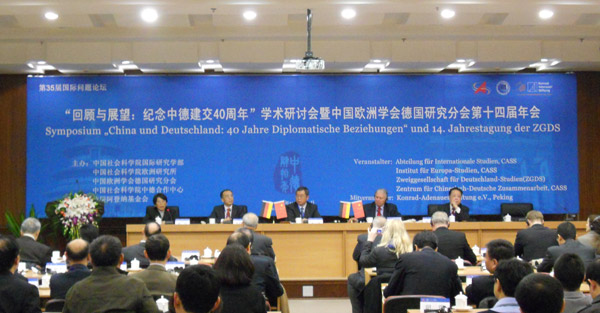To Celebrate the 40 Years of China-Germany Relations

A conference to celebrate the establishment of diplomatic relations between China and Germany was held in CASS during November 20-21, 2012. It was organized by IES along with the Society of German Studies at the Chinese Association of European Studies, Center for German Studies at CASS, and supported by the Konrad-Adenauer-Stiftung. Almost one hundred scholars, professors, government officials, businessmen, diplomats and students from Beijing, Shanghai, Tianjing and some other places attended the gathering.
Prof. Li Yang, Vice President of CASS said in his welcome address that great achievements have been made by China and Germany in deepening their bilateral relations in every field over the past four decades. He expressed his desire to further promote academic exchanges between the academic organizations and think-tanks from the two nations in the near future.
Mei Zhaorong, former Ambassador to Germany, said in his key-note speech that, despite zigzags, China-Germany relations have been moving forward steadily, thus greatly benefiting both China-European relations and world peace and development. According to the senior diplomat, China can draw many lessons from Germany’s experiences in developing the market economy and improving the quality of human resources. He also wished that the two nations should further strengthen people-to-people contacts in the future.
Dr. Michael Schaefer, German Ambassador to China, went over the 40 years of history of the bilateral relations and said highly of the achievements in this regard. He believed that the 21st century is undergoing dramatic changes and proceeding towards a multilateral end. Therefore, both Germany and Chine need to cooperate more in every area. He acknowledged that China has become an important partner for Germany, and predicted that more cooperation and exchanges will take place after China’s 18th party congress.
Li Xiaosi, Deputy Director of the European Department of the Chinese Foreign Ministry was also satisfied with the success and excellent results of the bilateral relations over the past four decades. He noted that China’s relations with Germany go beyond the bilateral fields and wished that both nations need to take care of the other’s concern over its own national interest so that common ground can be founded for the future. He believed that between the two countries there is no doubt that complementarity overtakes competitiveness. He also wished that Germany could play a more important role in pushing the China-EU relations forward.
Dr. Eberhard Sandschneider, Otto Wolff-Director of the Research Institute, German Council on Foreign Relations (DGAP), said that there are three deficits found in the Germany-China relations: a deficit of mutual understanding, a deficit of mutual trust, and a deficit of co-evolution. He argued that China should learn from Germany’s past experience, meaning that cooperation in international affairs is needed when a country is rising with confidence so as to curtail nationalism. He also pointed out that Germany needs to learn from China’s pragmatism.
The opening ceremony was chaired by Prof. Zhou Hong, Director of IES. In her presentation at the first panel discussion, she suggested that China and Germany should move forward with more determination to cooperate in every field. She noted that, in international relations, when power transformation occurs, countries with large influence tend to suffer from increased tensions with others, and China and Germany should avoid this outcome.
At the conference a book on China-Germany relations was inaugurated. Prof. Gu Junli, Director of the Society of German Studies at the Chinese Association of European Studies, and editor of the book, offered a brief account of the 445-page long book, which covers the bilateral relations in historic perspectives as well as about its latest developments.
- Back _articles: EU Diplomat on EU's Innovation Policies at IES
- Next _articles: Annual Conference of British Studies in China